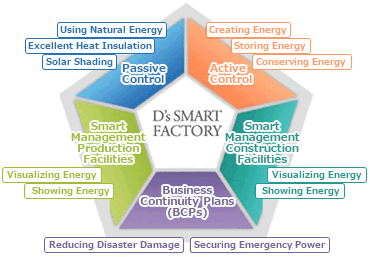FactoriesD's SMART FACTORY
Concept
Offering the Future of Manufacturing by Making Full Use of Advanced Environmental and Energy-Conserving Items
As global warming grows more serious, not only is environment consciousness a social responsibility of corporations, risks such as skyrocketing energy costs, unstable power supplies, and sudden natural disasters have also had a major impact on Japanese "monozukuri" (manufacturing).
As we enter this new era, Daiwa House offers an environmentally conscious "D's SMART FACTORY" that makes full use of advanced environmental and energy-conserving items, and which can support smart management including production facilities and BCPs (business continuity plans).

Key Points
1. Offering total environmental and energy-conserving items

(Passive Control)
Daiwa House offers total environmental consciousness using the power of nature.
(Active Control)
Energy creation, conservation, and storage are achieved with the latest items.
(Smart Management)
Not only is it possible to optimize the entire factory by comprehensively managing and visualizing production and construction facilities, "showing" visualization can also be used to contribute to further streamlining.

[Major Environmental Items](Japanese Only)

2. Offering business continuity plans (BCPs) that enable early recovery when disasters occur
Early production recovery is a must when factories are shut down by disasters or accidents, and earthquakes in particular must be dealt with in Japan. In order to support BCPs, Daiwa House offers the securement of emergency power as a means of reducing the damage caused by earthquakes when power supply is halted.
Fiscal 2013 Energy Conservation Grand Prize (Energy Conservation Case Study) METI Minister Award (CGO or Corporation) Two Years in a Row

Towards Commercializing a Next-Generation Energy-Conserving Factory
- Efforts towards Minimizing Energy Consumption in Daiwa House's Own Factories -
Under the CGO's leadership (the executive responsible for the environment), Daiwa House carries out energy conservation activities through coordination between production and development and design departments, and in Fiscal 2014, was able to reduce CO2 emissions at factories by sales amounts by 48% when compared to Fiscal 2005 levels. In particular, our model factory (the Kyushu factory) successfully achieved a reduction of 64%.
Next, based on the proof-of-concept of the model factory, Daiwa House commercialized its next-generation environmentally conscious "D's SMART FACTORY," and is broadly offering it to customers while at the same time receiving awards for this activity.



